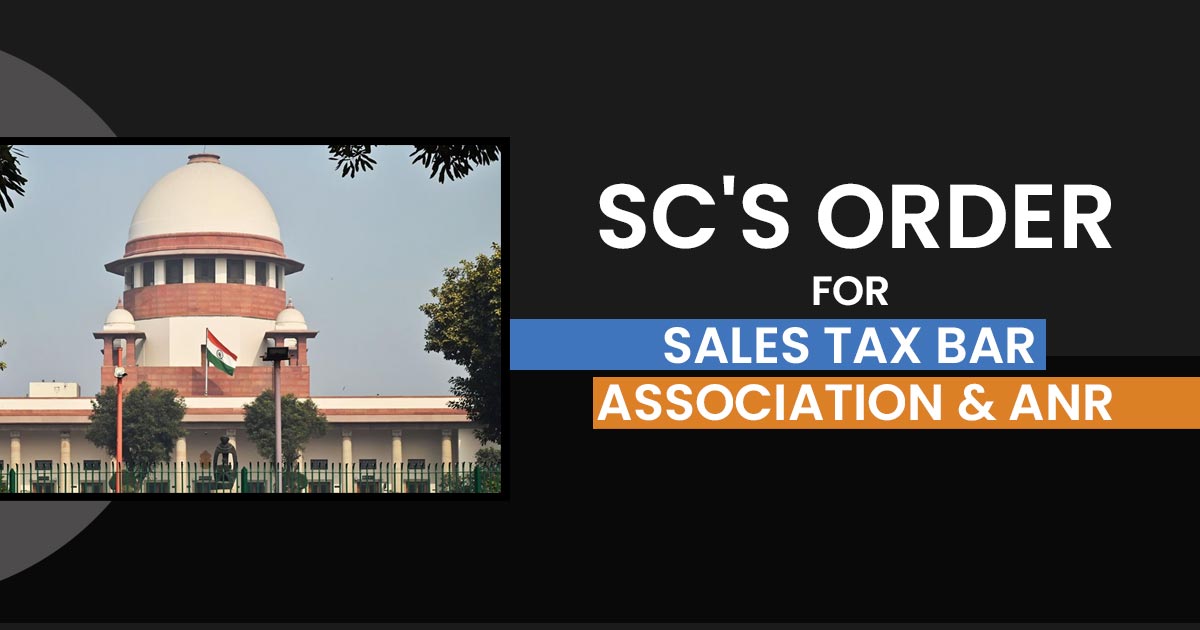
The Supreme Court in recent times has issued a writ petition notice contesting the validity of the constitution of sections 149 and 150 of the Finance Act, 2023 that seek to substitute Sections 109 and 110 of the Central Goods and Services Tax Act, 2017 (CGST Act). Such provisions pertained to the appointments and the service conditions of the members of the Appellate Tribunal under the CGST Act.
Petitioner no. 1 is the Sales Tax Bar Association and Petitioner no. 2 is a member of the same. The plea was listed to the Bench of Justices CJI DY Chandrachud, Justice JB Pardiwala, and Justice Manoj Misra.
Section 109 furnishes for the constitution of the Goods and Services Tax Appellate Tribunal and Section 110 states the appointment, qualification, and conditions of service of the President and Members of the Appellate Tribunal.
The petition challenges certain sections based on legal precedents set in the Madras Bar Association cases spanning from 2010 to 2021. Notably, the Bench has linked this petition with another one contesting the Tribunals Reforms (Rationalization and Conditions of Service) Ordinance 2021, now the Tribunals Reforms Act, 2021.
The petitioners contest the validity of these provisions on multiple grounds:
- Firstly, the absence of a provision allowing Advocates to become Judicial Members, which conflicts with the Union of India v. R. Gandhi, President, Madras Bar Association, 2010 11 SCC 1 (Section 110(1)(b) of the CGST Act).
- Additionally, it’s argued that the prescribed maximum tenure of 4 + 2 years with age limits of 67 years (for the President) (Section 110(9) of CGST) and 65 years for Judicial and Technical members (Section 110(10) of CGST) is exceedingly brief and inadequate. This setup would mean a mere 3-year tenure for a High Court judge as a judicial member and a mere 2-year tenure for a Supreme Court judge. The petitioners consider this duration “insignificant and insufficient” for a tribunal designed for specialized functions.
- Also in Madras Bar Association Vs. Union of India and Anr., (2022) 12 SCC 455, the Top Court has mandated that the term of a member will be 5 years.
- The provision of section 110(14) opens the window for the President or the members to appear, act, or appeal excluding before the Principal Bench or the state bench where he was the President or as per the case, a member is violative of the principle of the prudence and impartiality.
- The petitioner contends that the mandatory requirement of only 4 members for a principal bench and state is arbitrary and illogical. This limitation prevents the addition of 2 more members at a specific location, illustrating its irrationality.
- Furthermore, the provisions regarding terms, salary, allowances, and the removal of members are contested as they infringe upon the doctrine of separation of powers. The petitioner argues that the government’s absolute control and discretion in these matters lead to a clear undermining of this doctrine
Read Also: SC Overturns HC Decision Denying ITC Claim Citing Absence of Apportionment Calculation
“The government’s unilateral power to transfer members severely weakens the principle of separation of powers” the petition emphasizes.
Lastly, the petitioner reinforces these arguments by referencing the 272nd Law Commission report, which aligns its recommendations with the aforementioned judgments. Consequently, the petitioners assert that the current provisions starkly contradict these recommendations and established principles.








